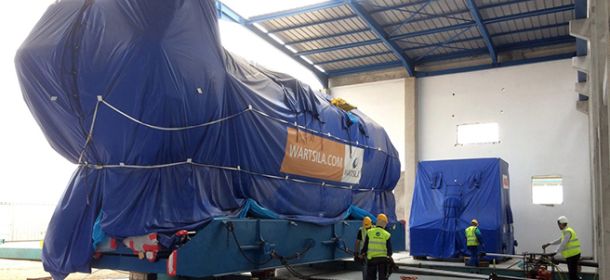
Finnish energy company Wärtsilä has struck a deal with the Moroccan government to supply a power plant to Dakhla - a town located well outside of Morocco, and inside occupied Western Sahara.
In early August 2017, the technology group announced it would supply a 22 MW baseload power plant to Morocco's state utility ONEE (Office National de l'Électricité et de l'Eau Potable). "The power plant consists of two Wärtsilä 46 engines, operating on heavy fuel oil with the capability to use light fuel oil as a back-up. This order is booked in the second quarter of 2017. The equipment will be delivered in early 2018, and the plant is expected to be fully operational in January 2019", Wärtsilä's press release reads.
But the press release does not mention the precise location of the project. It only says the power plant will be installed in "Morocco".
The Moroccan media was more candid, specifying that the 22 MW power plant for which Wärtsilä has been contracted, will be installed in Dakhla.
Dakhla is a coastal town in the southern part of Western Sahara, a stretch of land the size of the UK that the UN considers as the last unresolved colonial question in Africa. Since 1975, three-quarters of the territory have been military occupied by Morocco.
Morocco's national electricity agency ONEE exploits the site in Dakhla that is currently made up of 3 Wärtsilä power stations. The first plant was implemented in June 2002 and consisted of three Diesel groups of 7 MW each. The first extension was delivered in December 2010, comprising a group of 16.5 MW, and a second extension of 16.45 MW was installed in June 2015.
The Finnish Peace Committee confronted Wärtsilä on its involvement in occupied Western Sahara back in September 2010. The company then replied that "from the Wärtsilä's point of view, it is difficult to see that this project is doubtful in any way." The company also stated that "we have indirectly contributed to the welfare of the construction of environmentally benign, modern and reliable energy solution that will benefit households, hospitals and industry. Electricity in Western Sahara is needed, regardless of which government has jurisdiction in the area."
The construction of the new plant will thus increase production capacity in Dakhla from 54 MW to 76 MW. In its press release, Wärtsilä boasts it "will now have an installed base of 189 MW in Morocco, the total installed base in Africa being 6 GW".
In reality, Wärtsilä will have installed 112 MW in Morocco proper (in Tan Tan), and 76 MW in occupied Western Sahara, through a deal with the occupying regime.
In December 2016, the Court of Justice of the European Union ruled that since Western Sahara is a distinct and separate territory from Morocco, and that accordingly, no EU trade or association agreement with Morocco could be applied to Western Sahara. The judgment puts European corporations' business deals in Western Sahara on loose sand.
Morocco allocates land in occupied Western Sahara to green hydrogen investors
Morocco’s ambitions to become a global green hydrogen powerhouse are accelerating. Yet, Rabat is allocating land in a territory it does not legally own.
US eyes minerals in occupied Western Sahara
Seeking to position itself as a key supplier of strategic minerals for Western powers, Morocco has signed a new agreement with the United States that covers Western Sahara’s waters and the critical minerals harboured there.
TAQA-Moeve obtains land in occupied Western Sahara
Morocco’s push for green hydrogen has taken a decisive step forward - on territory it does not legally own.
EU-Morocco Statement: autonomy without self-determination, law without lawfulness
A joint statement that came out of last week’s EU-Morocco Association Council asks readers to believe in a fiction: that an undefined autonomy plan imposed by an occupying power can satisfy the right to self-determination, and that respect for international law can coexist with the systematic ignoring of the EU’s own highest court.



